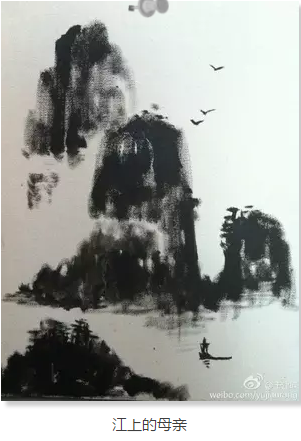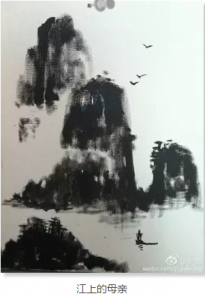Yu Jianrong—bold rural sociologist at the Chinese Academy of Social Sciences, starter of a viral Weibo campaign that reunited kidnapped children with their parents, outspoken advocate for political reform—is also a painter. This story about one of his ink works has been circulating online in November, as urgent as when he first wrote it in 2010.
Mr. President, There is Sadness Behind the Scenery
On the afternoon of May 18 [2010] I received an invitation from the German embassy to hold a small meeting with President Horst Köhler. On the prior recommendation of a German diplomat, I brought along one of my oil paintings. The president happily accepted the gift, praising it as “extremely beautiful.” I heard the praise, but it did not elicit happiness or pride. Instead, an indescribable grief welled up in my heart.The painting was a Chinese landscape, in black and white, of three hills by a river, three river gulls, a skiff drifting on the water, and a man with a punting pole gazing off into the distance. Perhaps my strokes couldn’t capture it, but the tranquil beauty of this scene was merely an illusion—the protagonist was in no way a traditional, content fisherman. When I put brush to paper, that small figure was narrating a desolate panic, in a wretched state of seeking but not obtaining; the three gulls were chanting the sad cries of unexpectedly losing their mother. Unfortunately, there was not enough time for me to tell the story behind the painting to the president. When the meeting ended, I was forced out the door by my grief, where I met wind and rain, as if the heavens too were giving vent with gloomy weather.
The painting was called “A Mother to the River Gone,” and was based on Mr Ye Fu’s essay of the same name. At a small gathering towards the end of last month, he gave me a copy of his essay “This Mundane World: An Elegy.” I didn’t think much of it at the time, but after I finally found the time to read it, I couldn’t help but cover my tears in a deep sigh.
The alternate title of Ye Fu’s essay is “Mother Disappeared Ten Years Ago.” While this means she’s missing, it’s actually that she cast herself into the river to her death. Only ten years later was the pained son collected enough to write this commemoration. His mother’s life was full of frustrations, brimming with hardships and sadness. War left her destitute and homeless. She was abandoned by her father, a major general in the Kuomintang. Her original sin made her a rightist. She struggled through poverty. In order for her son to start school she had to lay down her self-respect and ask others for help. Just when it seemed her luck might be changing, a sudden turn of events threw her even deeper into sadness and hardship. When she finally returned to her son, she saw him with the sorrow of someone “always on the run from the indifferent world.” When her son went to jail, she had not a word of blame for him—not only because of blind love, but also her persistent integrity. But at this point, she could no longer face the impermanence and ruthlessness of life. She finally found her freedom, and unburdened her children, by drowning herself. The son hovered over the surging Yangtze River for many days, scanning the surface for a floating corpse, his filial piety enough to move the workers on the docks, but not enough to move the heavens. He never found his mother’s body. His elder sisters at first held onto hope, but because of their mother’s self-respect and determination, they at last accepted reality.
This made me think of my own black household during those years, my mother sweeping up rice for our meals and dying burlap black to make me new clothes for school. To hide our humiliation, we wandered from village to village. We are all the children of this mother, we all grew up with this motherly protection. Mother’s kindness, spirit, and helplessness terrifies these sons and daughters, who weep endlessly. In precisely this mood, I made that painting.
A few days later, Ye Fu paid a visit to my studio in Songzhuang, and I gave him the painting as a present. He looked at the lonely little boat searching the river, and the mournful birds symbolizing his three siblings, and shed scalding tears. As I see it, this isn’t your ordinary story of a “son longing for the care his mother cannot give”—it’s merely a story of the frustration and loss of a ruthless era, and it is not simply a mistake of my comprehension. His tears were profound, a complicated mix of injustice, resentment, self-blame, pent-up frustration, longing, pity, and helplessness.
And so I decided to give the German president a gift. I made another painting with the same theme and mood, and wrote on the back “A Mother to the River Gone—Based on an Essay by Mr. Ye Fu.” I also gave the president the book Ye Fu had given me.
Of course, as the president of a strong Western power, Mr. Köhler found it difficult to appreciate the story behind the landscape, one full of deep and unhealing wounds. In the same way, I think that when we praise China’s immense progress, we fail to see the social defeat in which it is rooted. Just as in the painting, modern Chinese society is beautiful on the surface—high GDP growth, high rises and freeways, the Olympics and the World Expo, a swelling treasury and deeper involvement in international affairs, making the government very proud. But at the edges are vacant, terrified, self-anesthetized people with no peace of mind. Behind all the progress are the painful stories of the hard lives of infinite ordinary Chinese people.
These stories are real. I don’t want to use them to deny our achievements, but I do believe that only if we remember these stories can we appreciate true beauty and walk into a more beautiful tomorrow. [Chinese]
Translation by Josh Rudolph.








